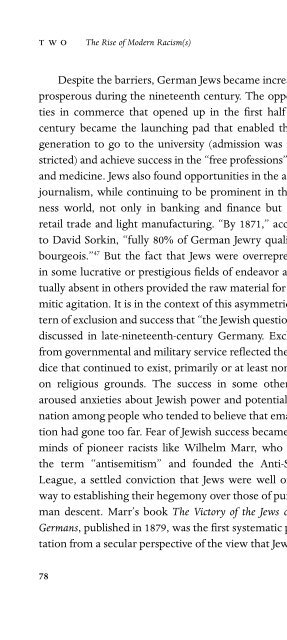Racism - A Short History - George M Fredrickson.pdf - WNLibrary
Racism - A Short History - George M Fredrickson.pdf - WNLibrary
Racism - A Short History - George M Fredrickson.pdf - WNLibrary
Create successful ePaper yourself
Turn your PDF publications into a flip-book with our unique Google optimized e-Paper software.
APPENDIX <strong>Racism</strong> in Historical Discourse<br />
probe the psychology of “race prejudice” and attempted to<br />
establish a functional equivalency between religious bigotry<br />
and animosities ostensibly based on physical type or<br />
ancestry. She viewed them both as leading to forms of “persecution”<br />
that differed only in how they were rationalized,<br />
and not in their essential nature. “<strong>Racism</strong> remains, in the<br />
eyes of history,” she maintained, “. . . merely another instance<br />
of the persecution of minorities for the advantage of<br />
those in power.” From this perspective, “the Third Reich is<br />
but following a long series of precedents in European anti-<br />
Semitism.” 26 She attributed American prejudice against<br />
blacks to “the persistence of slave-owner attitudes.” But she<br />
exposed the limits of racial liberalism in the United States in<br />
1940 when she called for a better deal for African Americans<br />
while conspicuously failing to advocate full and immediate<br />
equality: “Granted that great numbers of Negroes are not<br />
ready for full citizenship, the social conditions which perpetuate<br />
their poverty and ignorance must be remedied before<br />
anyone can judge what kind of citizens they might be<br />
in other, more favorable circumstances.” 27<br />
The war and the Holocaust inspired a vast outpouring<br />
of literature on the history of antisemitism, much of it<br />
stressing its religious roots and eschewing comparisons with<br />
racism targeted at other groups. Disagreements developed<br />
on the question of whether the Nazi urge to eliminate Jews<br />
on the basis of “race hygiene” was a continuation of earlier<br />
antisemitic attitudes based, ostensibly at least, on religion,<br />
or whether it was a radical new departure, a sine qua non<br />
for the Holocaust. 28 Those who endorsed the latter view<br />
sometimes employed a definition of racism that would<br />
make the term apply only to “eliminationist antisemitism.”<br />
166
















